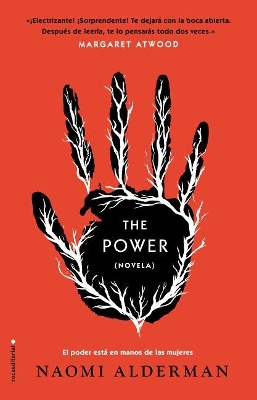Reviewed by Jo on
Trigger Warning: This book contains rape, of men and women.
I'm not one who reads general fiction, generally. I only discovered The Power by Naomi Alderman because it won the Bailey's Women's Prize for Fiction. When I heard it was about teen girls getting power - literal, physical power - I had to get it. But I've finished it with mixed feelings. That's not to say The Power isn't a good book. It is a good book - it's a great book, even - I just don't think it's my kind of book.
The story starts with a letter from Neil Adam Armon, a historian, to Naomi Alderman. Neil is a historian, and he's sent his latest manuscript to Naomi to critique for him. He mentions that history books are often too dry for readers, and so with this book, he's decided to fictionalise history; 'Not quite history, not quite a novel. A sort of "novelization" of what archeologists agree is the most plausible narrative.' (p ix) What follows is Neil's history-in-story-form book, The Power - written thousands of years in the future, about events, that for us readers, could happen now, in our present. Figures from history in Neil and Naomi's time are characters in their own story, about how the everything changed in a global scale when, around the same time, teenage girls discovered they could produce electricity from their fingertips. How the power dynamics of the world changed when women had the power.
The Power is told over the span of ten years, from when teenage girls first discover their power, to when the world is changed completely, becoming unrecognisable as the world we know, to a world run by strong, vicious women with power. It's told from four different perspectives ; Reagan - whose father is the head of a criminal syndicate, whose power is woken when her mother is murdered by her father's rival - who becomes one of the strongest with her power; Tunde, a Nigerian guy who makes a name for himself as a journalist, going to dangerous parts of the world and reporting on how things are changing now women have the power; Allie, who comes to be known as Mother Eve, who hears a voice that guides her into creating a new religion, where God is known as Mother, not Father, where the women of the Bible are revered over all men (including Jesus) - a religion that overpowers all other religion, giving Allie political power as well as physical power; and Margot, a Mayor whose daughter's power is unpredictable, who has the power woken up in her, and uses the power for her own political gain.
This book is so, so very clever. It's pretty epic; it's such a big story in terms of plot - and is yet a single, stand alone novel of just 339 pages. It took my emotions on a roller coaster; at times, I was overwhelmed with a sense of rightness and pride when women were finally able to fight back against their abusers, against the people who set rules in other countries about how they should live their lives. Women who had been controlled and abused for so long - women who exist today in various parts of the world, because women are sex trafficked, and women in certain countries do not have the same rights as men, this book shining a light on how wrong our world is right now - taking back control and hurting those who hurt them. And then I would be absolutely staggered and disgusted at the treatment of men now women had control. There was a sense of women getting their own back, but after a while, it stopped being about revenge, and became a sick amusement. Women now had power, women now had control over men. They would abuse men for the fun of it, murder without a thought. It was horrific and so disturbing. Women become just as terrible as some men who exist today, and it's a widespread terribleness.
So yes, The Power is clever, and epic, and thought provoking, and highly disturbing in a good way. All of this I can say objectively. But subjectively, I can't really say I enjoyed it. The Power is so good, but I didn't enjoy it. Of course, there are some books that it seems weird to say you "enjoyed" them, when the subject matter isn't the best, but there is still a sense that you liked the book. I don't think I like The Power. And I can't say why exactly, because I was gripped, and I was amazed and awed by the story about it, and of course I would recommend it. I think my problem is I didn't like most of the characters, and while it's not always important to like the characters to like a book, for this book, for me, it is. Although I finished the book thinking "Wow!", I didn't finish the book feeling I had a positive reading experience. It's a strange one, because it's a book that will stick with me for a very long time, one I would highly recommend to everyone, but at the same time, I just know I didn't like it, and I won't be re-reading it. But again, it's important to point out that I didn't like it because the book is bad, because it's brilliant, my dislike is down to personal taste. Because this book is incredible. It's just not my book.
Reading updates
- Started reading
- 2 September, 2017: Finished reading
- 2 September, 2017: Reviewed
